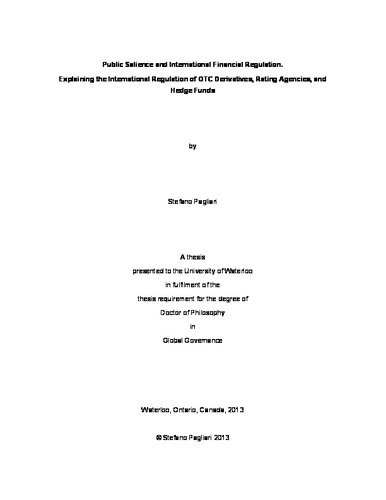| dc.contributor.author | Pagliari, Stefano | |
| dc.date.accessioned | 2013-02-21 14:16:26 (GMT) | |
| dc.date.available | 2013-02-21 14:16:26 (GMT) | |
| dc.date.issued | 2013-02-21T14:16:26Z | |
| dc.date.submitted | 2013 | |
| dc.identifier.uri | http://hdl.handle.net/10012/7344 | |
| dc.description.abstract | What explains the shift towards greater direct public oversight of financial markets in international financial regulation that has characterized the response to the global financial crisis of 2007-2010? Over this period, the main international financial regulatory bodies have abandoned the market-based mechanisms that had informed their approach towards the regulation of different financial domains in the years before the crisis and significantly expanded the perimeter of state-based regulation. However, the extent and the timing of this shift cannot be regarded only as the by-product of the crisis, nor they can be explained by the existing interpretations of the political determinants of international regulatory policies. This study builds upon existing state-centric explanations of international regulatory policies, but it goes beyond these works by exploring how the preferences of the most influential countries in response to the crisis have been influenced by variations in the degree of public salience of different financial domains. More specifically, this study argues that the lasting increase in the public salience of financial regulatory policies in the US and different European countries since the last quarter of 2008 has created strong incentives for elected officials in these countries to challenge the market-based approach that had emerged in the decade and half before the crisis and to directly interfere in the international regulatory agenda. In order to explain this shift, this study will analyse the evolution in the international governance of three sets of markets and institutions that have occupied an important position in the international regulatory agenda in recent years: 1) OTC derivatives; 2) rating agencies; 3) hedge funds. Besides making an empirical contribution to the literature on the politics of international financial regulation, this study also contributes theoretically to this literature by deepening our understanding of the nexus between international regulatory coordination and domestic public opinion. | en |
| dc.language.iso | en | en |
| dc.publisher | University of Waterloo | en |
| dc.subject | Financial Regulation | en |
| dc.subject | Derivatives | en |
| dc.subject | Hedge Funds | en |
| dc.subject | Rating Agencies | en |
| dc.title | Public Salience and International Financial Regulation. Explaining the International Regulation of OTC Derivatives, Rating Agencies, and Hedge Funds | en |
| dc.type | Doctoral Thesis | en |
| dc.pending | false | en |
| dc.subject.program | Global Governance | en |
| uws-etd.degree.department | Global Governance | en |
| uws-etd.degree | Doctor of Philosophy | en |
| uws.typeOfResource | Text | en |
| uws.peerReviewStatus | Unreviewed | en |
| uws.scholarLevel | Graduate | en |

